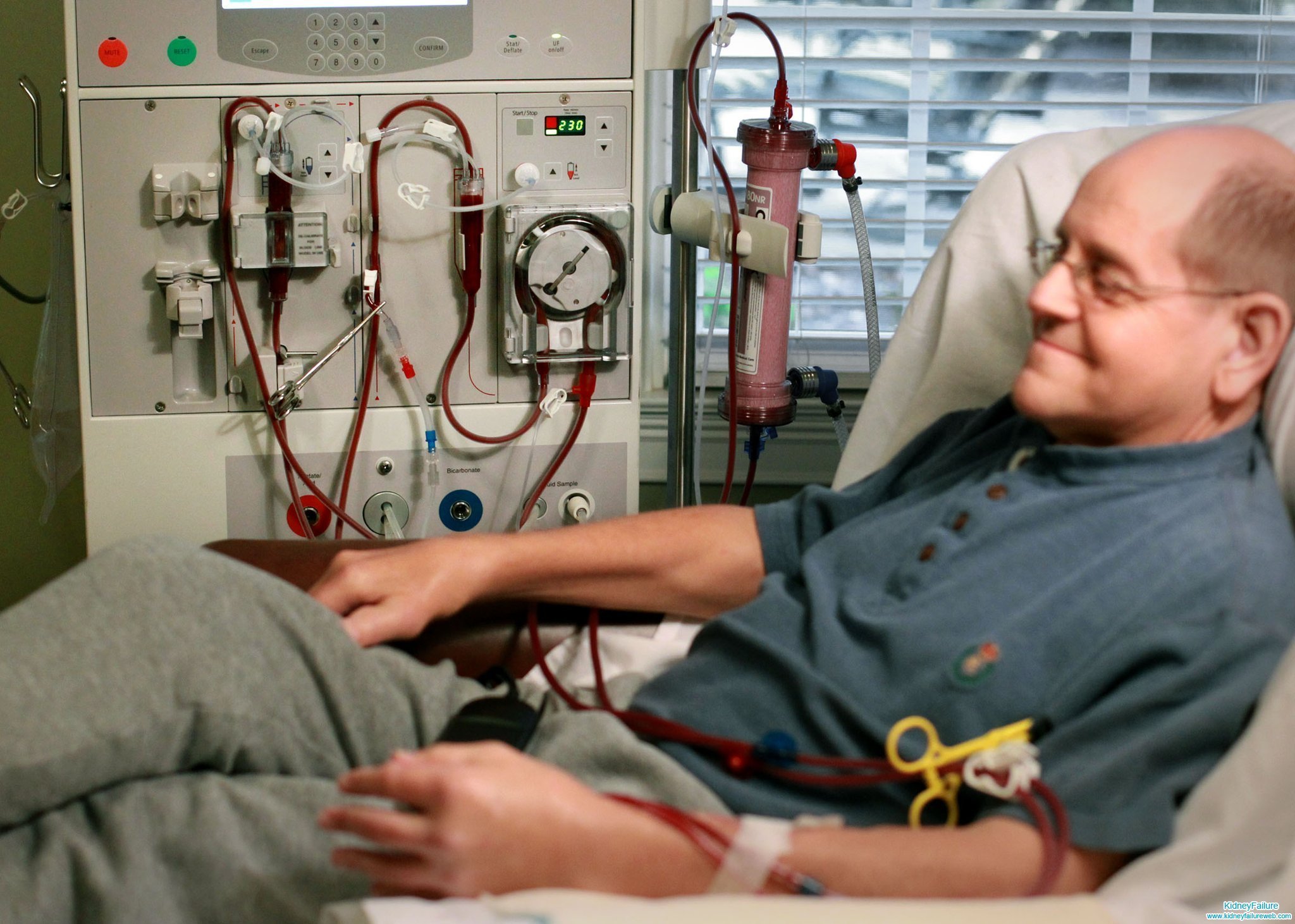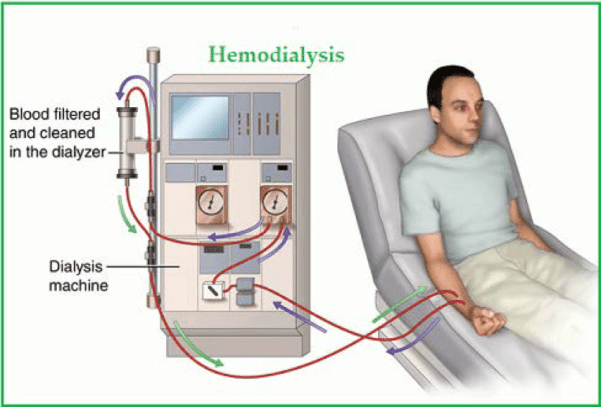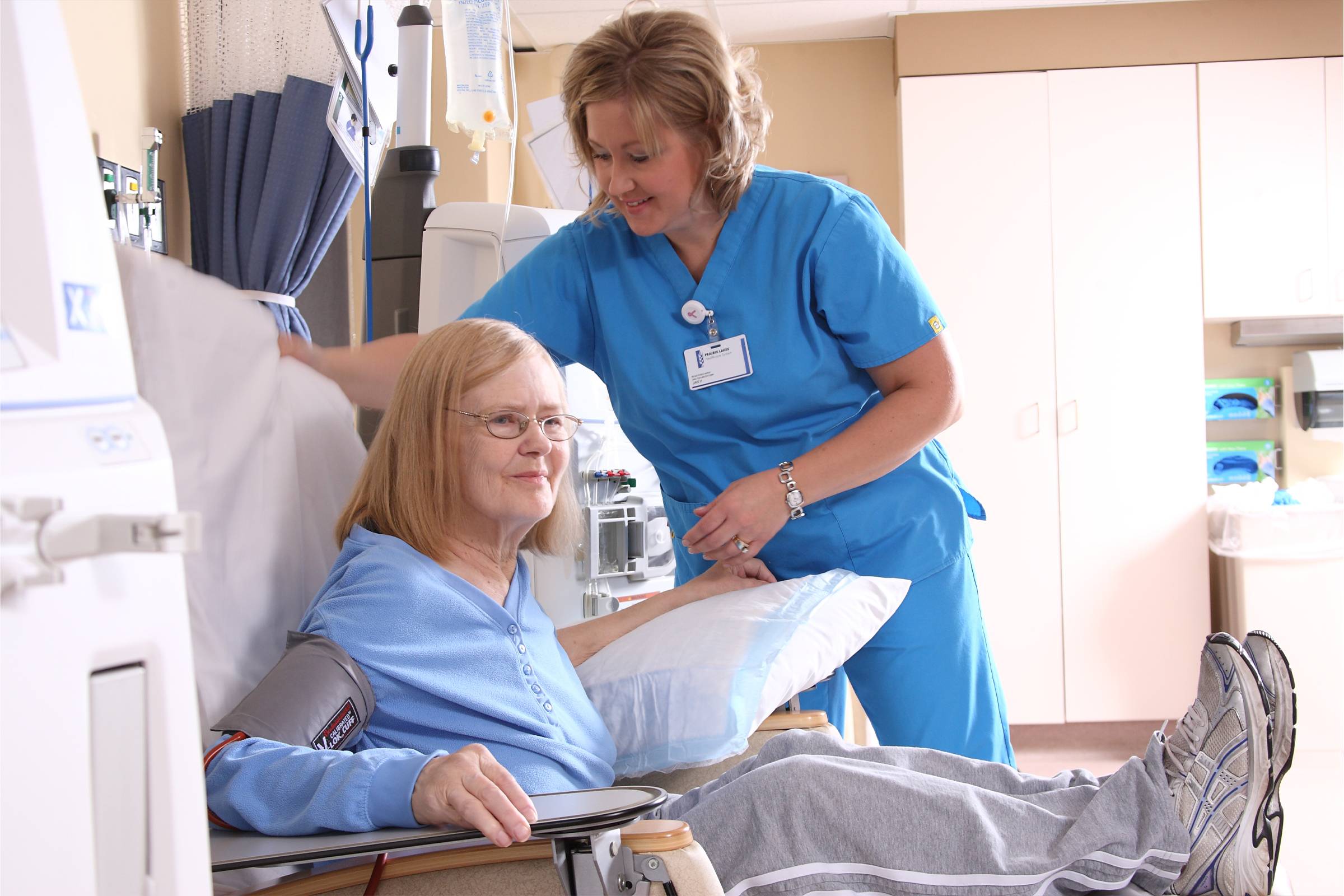Many Patients With Kidney Failure Regret Initiating Dialysis
by American Society of Nephrology
Results from a new study indicate that many patients with kidney failure regret initiating dialysis, and those who choose dialysis to please their doctors or family members may be more likely to experience regret. The findings appear in an upcoming issue of CJASN.
Sometimes patients experience regret when they reflect on a decision they’ve made about their medical care, and this can negatively affect their quality of life. For patients with kidney failure who cannot receive a transplant and are contemplating dialysis, it’s important to have discussions with kidney specialists and other experts who can explain the impacts that dialysis may have on their lives.
Because few studies have examined regret in patients after they’ve started dialysis as a treatment for kidney failure, a team led by Fahad Saeed, MD and Paul R. Duberstein, Ph.D. analyzed survey responses related to regret in patients receiving maintenance dialysis from 7 dialysis units in the Cleveland, Ohio area.
Eighty-two of 397 respondents reported regret that they decided to initiate dialysis. There were no significant demographic factors linked with regret. Regret was more common when patients reported choosing dialysis to please doctors or family members. Patients who reported discussing life expectancy with their doctors and those who had completed a living will were less likely to report regret that they started dialysis.
Explore further
Treatments For Kidney Failure
The two treatments for kidney failure are kidney transplantation and dialysis. Two different types of dialysis can be done – hemodialysis and peritoneal dialysis.
To learn more about each type of treatment, see “Choosing a Treatment for Kidney Failure” in the A-to-Z Guide.
What Questions Should I Ask About Conservative Management
If youre thinking about conservative management, you may want to ask your doctor these questions:
- Is conservative management a treatment option for me to consider?
- Will dialysis improve my quality of life?
- Will dialysis prolong my life?
- Is there any downside to trying dialysis first?
- What should I do to prepare for conservative management?
- Who will continue to provide my care?
- Who will help my family?
- How long will I live?
- Will I be in pain?
- Can I stay at home?
- Where can I learn more about hospice?
- Who can I talk with about finances, advanced directives, sex, or family concerns?
Learn about conservative management.
You May Like: Is Watermelon Good For Your Kidneys
Do You Continue To Make Urine After Starting Dialysis
Unless your kidneys have completely shut down and the glomerular filtration rate has gone down to absolute zero, many patients will continue to produce urine even after starting dialysis. However, just because you make urine does not necessarily mean that you don’t need dialysis. The decision to initiate and maintain dialysis is based on multiple factors including lab tests and patient’s symptoms and not necessarily on the volume of urine one makes.
In simple terms, kidney function that remains after one starts dialysis is called residual renal function. It could be a very small fraction of what normal kidney function is.
Factors that determine whether one might preserve residual renal function could include:
- In general, patients on peritoneal dialysis will tend to make urine from their kidneys longer than patients on hemodialysis.
- Cause of kidney failure makes a difference
- Blood pressure control: Drops in blood pressure will tend to accelerate the loss of one’s residual renal function
- Medications: certain ones could help your cause, while others could hurt
- Non-white race is associated with a faster loss of residual kidney function
- Female sex
How Long Will I Need Dialysis For

It depends. In some cases, kidney failure may be a temporary problem and dialysis can be stopped when your kidneys recover.
But often, someone with kidney failure will need a kidney transplant.
It’s not always possible to carry out a kidney transplant straight away, so dialysis may be needed until a suitable donor kidney becomes available.
If a kidney transplant is not suitable for you for example, because you’re not well enough to have a major operation dialysis may be needed for the rest of your life.
Also Check: Osteocleanse
How Do I Prepare For Hemodialysis
Dialysis is a complex treatment that takes time to understand. Because most people dont feel sick until shortly before starting dialysis, youll likely still feel well when your doctor first talks to you about getting ready for dialysis. No one wants to start you on dialysis before you need it, but it takes time to prepare for dialysis.
Cytokine Storms Can Destroy Kidney Tissue
The bodys reaction to the infection may be responsible as well. The immune response to the new coronavirus can be extreme in some people, leading to what is called a cytokine storm.
When that happens, the immune system sends a rush of cytokines into the body. Cytokines are small proteins that help the cells communicate as the immune system fights an infection. But this sudden, large influx of cytokines can cause severe inflammation. In trying to kill the invading virus, this inflammatory reaction can destroy healthy tissue, including that of the kidneys.
Don’t Miss: How Much Money Is A Kidney Worth
How Will My Care Be Organised
You may receive care in hospital, at home or in your local community . Your medical care will normally be managed by your kidney doctors together with your GP, whose role like that of the district nurse may increase if your kidney failure gets worse and you require a greater level of end of life care.
Dont hesitate to speak to your kidney doctor or nurse if you have any queries or concerns about your future care. You can also find information about other forms of support, together with advice on managing your medications and taking care of your mental health in our How can I help myself? section.
What Happens During Hemodialysis
During hemodialysis, the dialysis machine:
- Removes blood from a needle in your arm.
- Circulates the blood through the dialyzer filter, which moves waste into a dialysis solution. This cleansing liquid contains water, salt and other additives.
- Returns filtered blood to your body through a different needle in your arm.
- Monitors your blood pressure to adjust how fast blood flows in and out of your body.
Recommended Reading: Does Red Wine Cause Kidney Stones
How To Lower Creatinine Levels And Improve Kidney Function
Healthy kidneys maintain the blood creatinine within a normal range. However, as kidney function declines, the kidneys may be unable to clear the creatinine level in the blood. Abnormally high levels of creatinine could indicate potential kidney malfunction or failure. For this reason, the doctors conduct a creatinine test to determine how well your kidneys perform.
Any condition that affects the function of the kidneys is likely to elevate the creatinine level in the blood. It is essential to work with your nephrologist to develop a treatment plan to address any medical issues that might be implicating your kidney function.
In this article, we will look at the definition of creatinine, the test to determine the creatinine levels in the blood, ways to lower creatinine levels, and myths about lowering creatinine.
What Is An Advance Directive And Why Would I Want To Prepare One
You can make your treatment plans and wishes clear to health care providers and family members with an advance directive. During a medical crisis, you might not be able to tell your health care team and loved ones how you want to be treated or cared for. An advance directive is a written legal statement or document with your instructions either to provide or not provide certain treatments, such as dialysis, depending on what else is happening with your health. Advance directives may include
- a living will
- a durable power of attorney for health care decisions
- a do-not-resuscitate order
Don’t Miss: Is Watermelon Good For Kidneys
How Long Can You Live On Dialysis
If your kidneys have failed, you will need to have dialysis treatments for your whole life unless you are able to get a kidney transplant. Life expectancy on dialysis can vary depending on your other medical conditions and how well you follow your treatment plan. Average life expectancy on dialysis is 5-10 years, however, many patients have lived well on dialysis for 20 or even 30 years. Talk to your healthcare team about how to take care of yourself and stay healthy on dialysis.
What Other Federal Programs Can Help

The Social Security Administration can provide financial help through two programsSocial Security Disability Insurance and Supplemental Security Income .
- SSDI pays a monthly amount to people who cant work and have paid enough Social Security taxes. If you have an illness or injury that Social Security believes will keep you out of work for at least a year, SSDI payments may be an option. There is a 5-month waiting period before SSDI payments begin.
- SSI pays a monthly amount to disabled children and adults who earn little and dont have many financial assets. A person who gets SSI may be able to get food stamps and Medicaid, too.
Read more about both SSDI and SSI and learn how to apply at SSA.gov or by calling 1-800-772-1213 .
Recommended Reading: Is Grape Juice Good For Kidney Stones
Who Can I Talk To If I Want To Consider Active Supportive Care
It is important that you talk to your kidney doctor or specialist nurse so you can get a clear understanding of what it would mean for you if you decide not to start dialysis. It can really help to get your family involved in these conversations too. Your doctor may also suggest involving other professionals such as a social worker or a counsellor to help support you and help you decide what is right for you.
How Does Peritoneal Dialysis Work
It uses the lining of your belly to filter your blood. A few weeks before you start treatment, a catheter is placed near your navel. Once the area heals, youâll be trained on how to do PD since youâll be doing it yourself.
Youâll use the catheter to transfer dialysis solution from a bag into your belly. This special fluid contains water with salt and other additives. It soaks up waste and extra fluids inside your body. After a few hours, youâll drain it out into a separate bag. This process is called an âexchange.â
There are two kinds of PD:
Continuous cycling peritoneal dialysis : This uses a machine to do your exchanges.
Continuous ambulatory peritoneal dialysis : Youâll do your exchanges by hand.
Youâll likely do four to six exchanges each day. Your doctor can help you decide which type fits your lifestyle. Some people do both.
Also Check: What Is Flomax Used For Kidney Stones
What Are The Pros And Cons Of Capd And Automated Peritoneal Dialysis
With either CAPD or automated peritoneal dialysis, you gain a sense of control over your treatments and dont need the help of a partner. After youre trained, you can do CAPD and automated peritoneal dialysis by yourself. With peritoneal dialysis, youll have boxes of dialysis solution taking up space in your home.
CAPD pros
- You dont need a machine to do CAPD.
- You can do CAPD at the times you choose, as long as you complete the required number of exchanges each day.
- You can do CAPD in many locations.
- You can travel as long as you bring dialysis supplies with you or have them delivered to where youre going.
CAPD cons
- CAPD can disrupt your daily routine.
- CAPD is a continuous treatment, and you need to do all exchanges 7 days a week.
Automated peritoneal dialysis pros
- You can do exchanges at night while you sleep.
- You may not have to perform exchanges during the day.
- You can travel as long as you bring dialysis supplies with you or have them delivered to where youre going.
Automated peritoneal dialysis cons
- You need a machine. If you travel, you may have to carry your cycler with you.
- Your connection to the cycler limits your movement at night.
What Types Of Private Health Insurance Can Help
Some people with kidney failure use private health insurance to help pay for their health care
Read Also: What Tea Is Good For Kidney Function
When Do I Have To Start Dialysis
For most people, the need for dialysis comes on slowly. Symptoms, such as losing your desire to eat and losing muscle, may begin so slowly that you dont notice them. Many people start dialysis when their kidney function is between 5 and 10. When kidney function is this low, you may have symptoms from kidney failure and starting dialysis may help relieve them. Starting dialysis can help you regain your appetite and maintain your strength, which is harder to rebuild than it is to retain. Your health care provider can help you decide the best time to begin treatment.
What Happens If My Kidneys Fail Completely
Complete and irreversible kidney failure is sometimes called end-stage renal disease, or ESRD. If your kidneys stop working completely, your body fills with extra water and waste products. This condition is called uremia. Your hands or feet may swell. You will feel tired and weak because your body needs clean blood to function properly.
Untreated uremia may lead to seizures or coma and will ultimately result in death. If your kidneys stop working completely, you will need to undergo dialysis or kidney transplant.
Also Check: Does Red Wine Cause Kidney Stones
What Is The Childrens Health Insurance Program
CHIP offers free or low-cost Medicaid to children whose parents earn too much for Medicaid but not enough to pay for a private health plan. CHIP is run by the states, based on federal rules. In some states, CHIP may cover pregnant women and parents. Find out if your family members qualify for CHIP through Healthcare.gov or your states Medicaid or CHIP agency.
Learn more about CHIP at InsureKidsNow.gov, or call 1-877-543-7669.
What Are Some Ways To Pay For Kidney Failure Treatment

Medicare, the federal health insurance program, and private health insurance cover most of the cost. Medicare covers kidney failure no matter what your age. If you need more help to pay for treatment, state Medicaid programs provide funds for health care based on financial need. Your social worker can help you find more ways to pay for treatment.
Also Check: Is Cranberry Juice Good For Your Liver And Kidneys
What Other State Programs Can Help
Medicare Savings Programs are programs in which your state may pay your Medicare premiums, deductibles, and/or coinsurance if you have a low income and few assets. How Medicaid works in U.S. territories varies. Learn more about how your state Medicaid works online.
State Health Insurance Assistance Programs give local advice about health insurance to people who have Medicare or who are eligible for Medicare. SHIP counselors can help you choose the best plan for your needs. Find a SHIP counselor at shiptacenter.org or call 1-877-839-2675.
State kidney programs provide financial help and other services to people with kidney disease. Talk with your dialysis or transplant clinic social worker or financial counselor to find out if your state has a kidney program.
State Pharmaceutical Assistance Programs help pay for prescription medicines in certain states. Learn whats available in your state with the SPAP online locator.
How Much Does Dialysis Cost
Exact costs for dialysis treatment vary greatly. For most patients, the federal government covers 80% of all dialysis costs. Although federal health insurance covers the majority of dialysis costs, 20% still falls to the patient. For patients without health insurance, dialysis is an even bigger expense. One dialysis treatment generally costs around $500 or more. For the usual three treatments per week, that would amount to more than $72,000 per year.
You May Like: Does Red Wine Cause Kidney Stones
What Will Happen If You Don’t Start Dialysis
If you don’t have dialysis, your kidneys will continue to fail and you eventually will die. How long you could live depends on your overall health aside from your kidney disease and how much kidney function you have left.
As death nears, you will start to:
- Feel sleepy and weak. You may sleep more and need help to walk, bathe, and use the toilet.
- Be less hungry. You may eat and drink less than normal.
- Lose interest in daily life. You may lose interest in the outside world and the details of daily life, including the day or time.
If you don’t have dialysis, health professionals who provide end-of-life care can help you have the highest quality of life possible. This may be done through hospice care. Hospice offers the chance to think about personal goals, relieve pain, and take care of your emotional and spiritual needs.